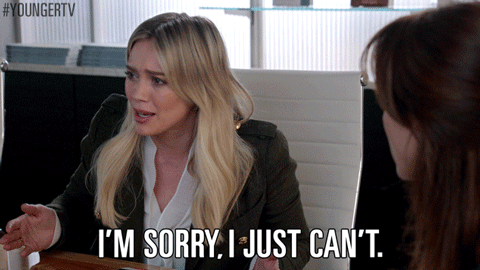Also written by Lily Coltoff.
Once upon a time, I scoffed at those who asked for extensions on papers or needed a shift covered. I negatively judged these people, wondering how someone could be so weak and disorganized. I fostered these thoughts until life punched me in the face. My junior year, I quickly learned that you can’t control every aspect of your life. I became the real life version of Jim Carrey in Yes Man. I, too, I continually said “yes” to more responsibilities, attending every hang out and working any extra shift I could squeeze into my schedule. However, unlike Jim Carrey, I wasn’t hypnotized; I was just born this way.
My mental and physical health took a huge blow from immense stress I put myself through. Because of my hectic schedule, I only slept about four to five hours each night. I developed permanent dark circles under my eyes and could hardly focus in my classes. As my body fell apart and my emotions spun out of whack, I became increasingly impatient and rude. I learned at an alarming speed that if you fly through life without listening to your body, you’ll burn out very quickly. So stop wondering why you constantly feel terrible or sick; start focusing on taking care of number one.
Read on For 10 Tips on How to Care for Your Mental Health.
1. Get Your Sweat On

Believe it or not, your eating and exercise habits can hold a lot of weight over how your mind (and body) functions. Think about how invincible a Starbucks latte makes you feel in the morning. If you squeezed in a workout and some protein in the morning instead, you’d probably be on fire the entire day. According to the Mental Health Organization, “A clear distinction is often made between ‘mind’ and ‘body’ but when considering mental health and physical health, the two should not be thought of as separate. Poor physical health can lead to an increased risk of developing mental health problems.”
When the going gets tough, I get going towards cookies. While the quick accessibility and cheap price of 10 chicken nuggets sounds great at first, your body will thank you for spending a little more than $1.49 at McDonald’s. Invest in fresh fruit and pencil in time for physical activity. “[Working out] is a habit you have to develop but definitely I would say finding a form of physical activity that you actually enjoy can help making time for it a lot easier,” said Florida State University Spin Instructor Joy Mikhail. The FSU alumna added, “We’re called to take care of our bodies and we’re privileged with having one. Taking care of it is key and it’s totally worth it. One hour a day can make such a difference for your body and mental health.” You don’t need to run a marathon, but finding a few minutes in your day to walk will significantly improve in your mood and stress level.
2. Get Enough Sleep

Let’s be real, how many of us get a full night’s sleep on the reg? Research from the CDC shows seven out of every 10 college students say they get less than the recommended amount of sleep every night. You know that friend who pulls an all-nighter before each chem exam, swearing he’ll catch up on sleep the next night? Well, let him know that the majority of people agree with him, but they’re all wrong. While you might feel better, your body won’t. Sleep deprived college students get sick because their immune systems run at reduced levels.
Frequent all-nighters for a huge exam seem logical at the time, but making a habit out of this pattern can be dangerous. According to the University of Georgia, students with sleep deprivation were found to have lower GPAs, due to the inability to concentrate, retain information and learn. “Sleep is when your body repairs itself. The idea that ‘I’ll just sleep 20 hours this weekend’ isn’t going to give your body the time that it needs to repair throughout the week so it’s going to impact your cognitive functioning, your immune system and your mood,” said Debra Weiss, University of Florida Licensed Mental Health Counselor. A lack of sufficient sleep may not be affecting just your mental and physical health, but also your GPA. We need to become more mindful about the time we go to bed, how many hours we sleep and what prevents us from getting the sleep we need (because our bodies need it desperately).
3. Prioritize Chill Time

Is your schedule packed tight with only seconds in between to breathe? Set time aside for yourself; you deserve it. “You need time to garden, go for a walk, paint, go rock climbing or just sit on the couch and watch Netflix sometimes because it can be critically important to your mental health, overall well-being and therefore your ability to function,” said University of Florida mental health counselor Debra Weiss. When you have that group project meeting, IM soccer practice, work until 10 p.m. and an essay due by midnight, you clearly have way too much on your plate. At this point, your multiple activities cut into your sleep, meaning you definitely don’t have any down time in your daily schedule. Regardless of your idea of “me time” (two glasses of wine or a bath), don’t forget to consider the last time you turned off your brain for at least a few minutes.
If your brainpower runs on empty, you won’t have the emotional and mental capacity to operate like your normal self. Definitely work hard and challenge yourself, but prioritize time to take a break to catch a movie with friends or throw the Frisbee around. “The ironic part is, we push so hard because we want to achieve and do well but then we start to burn out and our grades suffer. Whereas, had we carved out time for rest and time for fun, we would have decreased the possibility of becoming burnt out in the middle of the semester and increased our chances at excelling academically,” added Weiss. Avoid a fried brain by scheduling some chill time because, hey, you deserve to treat yo self.
4. Keep an Open Mind About Counseling

Counseling serves as a resource the university sets up for you. I finally decided to give counseling a chance when I realized I angrily refused to give it a shot every single time my friends, family and boyfriend suggested the option. To my surprise, the experience wasn’t nearly as awkward or painful as I feared. Sitting down with a counselor helped me debunk a lot of negative stigma I attached to therapy. Deep down I felt that my reasons for needing help weren’t valid and that counseling wasn’t for me, but no one set prerequisites for therapy like they do for upperclassmen courses. Rachel White, a licensed mental health counselor and director of the non-profit organization Her Song, said, “If we’re paying attention to our health, our bodies, mind and spirit and we find things disrupting our lives, I would encourage students to seek counseling.”
Prior to my first visit, I thought the last place I needed to go was a counseling center. If I needed to talk, surely a friend or family member would lend an ear and a shoulder to cry on—but this was different. Sometimes we can’t handle the juggling act of work, class and a social life. “I think it’s important to note that counseling, starting counseling, can happen at any time in our life cycle. It can be really helpful to go to counseling before you start to feel like you’re drowning,” said Weiss. Whether it’s life, a breakup, a roommate, family issues or your pet passing away—you can (and totally should) consider talking to somebody. “It can be a proactive and preventative action. In counseling, you can come in when you’re in crisis and you can come in before you get to the point of crisis—both are fine.”
5. Get Over the Fact That You Cannot Do Everything

As college students, we often feel the need to do all the things. Sometimes we’re trying to build up a grad school application or take on three jobs to make ends meet, but sometimes our bodies say, “slow down,” and we refuse to listen. Putting your health first isn’t irresponsible. Cut out the excess distractors in your life and manage your time accordingly so you can better make time for your physical, mental and emotional health. “Our bodies are followers. Wherever our brain goes and wherever our mind takes us, our body responds and follows that. Oftentimes when we have things going on with our bodies, those are clues or signals that we need to pay attention,” said White.
Both counselors Rachel White and Debra Weiss describe the importance of taking care of our body using the same word: critical. Your health reigns higher than that quiz you got a C on or going out with friends, and more important than finishing an entire season of Netflix in one day. In the midst of all the chaos that my life felt like a few months back, focusing my attention into these five tips helped me feel and function so much better. No drastic changes were made, and I still don’t have it all together. Learning how to minimize the stressors in my schedule helped me take control of my life and can help all of us stay on the top of our game.
6. Be In Tune With Your Body

If you have trouble concentrating or don’t feel great, your body’s probably trying to tell you something. You should listen. “In a lot of schools, [college] is a time where people are away from home for the first time and they really have to learn how to regulate themselves in a lot of different areas—you have to figure out on your own how much to sleep, eat, exercise, socialize and do work,” said Dr. Denise Lensky, the former deputy director of the counseling center at the University of Pennsylvania. Students in tune with themselves and what they need thrive more efficiently because they have the basic tasks of living down.
“It’s not really easy or obvious to figure out how to regulate yourself so that you can maintain your psychological well-being,” said Lensky. But you can start small with working to achieve simple goals like drinking enough water. That’ll help you fall into a healthy rhythm that feels comfortable and manageable for you.
7. Ask for Help From Friends

You shouldn’t have to deal with everything on your own. “Establish a friendship group with people whom you can be vulnerable with and develop those friendships so that when the stressors get to you, you have support,” said Dr. Jane Widseth, a Staff Psychological Counselor at Haverford College. Your peers may be more approachable and accessible than counselors. They’re also likely going through similar things to you, and can provide unique insight.
After all, your friends are right there on the front lines with you. Having a group of buddies willing to talk with you or listen to you vent feels like the best thing in the world. Even if they can’t help, they can find someone who can help you. Knowing when something is beyond your reach and then providing someone with the resources they may need to get help is still helping.
8. Learn How to Fail

Failing sucks. But just because you fail something doesn’t mean that you yourself are a failure. It just means that maybe that something isn’t for you.
Take Ryan Barto, a rising sophomore at American University. “As a freshman and a first-generation college student, the college experience was new and challenging. I became the president of Anderson Hall (the main freshman dorm) for the Residence Hall Association, a Student Government senator and the co-Chair of Community Engagement for the School of Public Affair’s Undergraduate Council,” he said. “All of these activities took time away from my academics, especially this one class, ultimately resulting in my first C ever.”
Yikes, right? “However, with every negative, there is always a positive. Through these student organizations, I was able to become an advocate for all students, meet a bunch of amazing people and grow as a person,” he said. “Getting a bad grade is never fun, but if you’re trying your best and seeking real, tangible change in the world, then it can be worth it.”
This proves that you can’t succeed at everything. That doesn’t mean that you shouldn’t still work at something, but if you know it’s hard, your best is good enough. Internalizing this will take so much stress off your shoulders and make it easier for you to focus on things that you’re good at and care about. It also makes you feel much better about yourself since you can say you know your strengths and weaknesses because you used the opportunity to learn about yourself rather than act self-critical.
9. Find What Helps You

Not every technique will work for every person. But that doesn’t mean that there’s not something out there that can help. Part of self-care means finding what works for you. For some people, that includes exercising. For others, it may include taking naps or finding a way to unwind.
If, however, you find yourself really struggling, or have been diagnosed with a mental illness, medication be helpful. Disclaimer: It doesn’t work for everyone or isn’t always an option. But there’s no shame. This treatment option can often help people feel much better. Since I started taking antidepressants over a year ago, I’ve experienced a substantial reduction in my anxiety and depression. I’ve also felt like I have some control back.
While meds can alleviate some symptoms, you should pair it with other techniques, such as mindfulness. “[It] involves bringing one’s attention to the moment in a deliberate, non-judgmental way. It allows one to observe one’s thought and feelings without reacting to them—noticing them without evaluating them,” said psychologist Abigail Huntington, OTR/L LMFT.
Since practicing mindfulness doesn’t require specific products or much time, it can serve as a powerful and helpful technique. “The practice of mindfulness meditation is a valuable tool that helps promote self-regulation and improved ability to attend,” said Huntington.
10. Know that this is Normal

It’s natural to feel overwhelmed and to struggle a bit. But once you start to compare yourself to other people, problems arise. Idealizing your perception of one person and using it to determine your flaws can lead to feelings of inadequacy, body image issues, risk-taking behaviors, anxiety and depression.
Keep in mind that everyone struggles in his or her own ways, and everyone handles and shows that differently. You can never really know if someone may possibly feel the same way that you do. Measuring yourself against someone else will ultimately only make you feel worse about yourself. If you’re having a rough time, know that you’re in the majority.
Remember that this is normal. It’s part of growing up. It will get better over time. You have so many resources available to you when it comes to looking after your mental health. But most of all, never feel ashamed of how you feel or who you are. College is a place to find and embrace your identity, so go forth and find what makes you, you.
*Updated by Lily Coltoff on June 1, 2017 to include mental health tips 6-10.



















